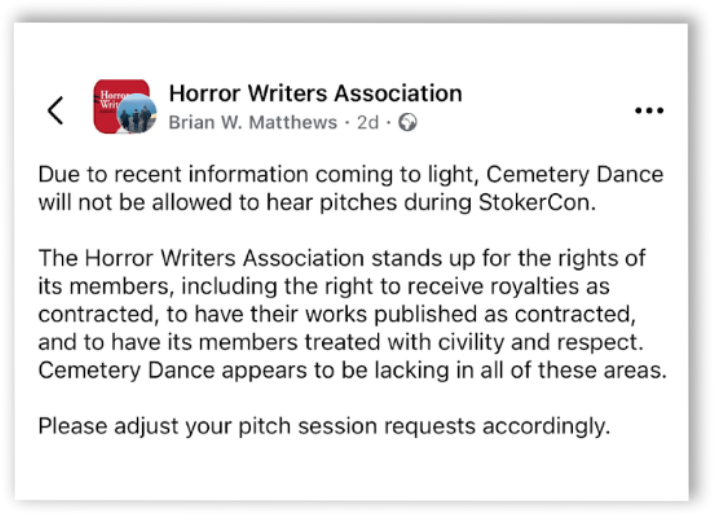What Authors Can Do When Their Publisher Fails to Pay Royalties

Protecting Your Rights, Reclaiming Your Work, and Moving Forward
Introduction: When Trust Is Broken
For authors, royalty payments are more than just numbers on a statement—they are a recognition of their creative work, a critical revenue stream, and a reflection of the success of their publishing efforts. When those royalty payments cease, the emotional toll can rival the financial impact. Unfortunately, delayed or missing author royalties are not rare, and even reputable publishers can face financial distress or operational mismanagement that affects their authors’ livelihoods.
In a digital-first publishing landscape, where authors have more tools and platforms than ever before, understanding how to protect your author royalties is essential. Whether you're traditionally published or hybrid, knowing what to do when royalty payments fail can safeguard your work and income.
Recent Cases of Non-Payment: A Wake-Up Call
The past few years have seen several high-profile publishing disputes, where authors have been left chasing unpaid royalties or unclear accounting. These stories have served as cautionary tales for both debut authors and seasoned professionals.
Cemetery Dance Publications
Cemetery Dance Publications, a respected name in horror publishing, came under scrutiny for reportedly failing to pay author royalties. This caused an uproar in the author community, particularly among horror writers. In response, the Horror Writers Association (HWA) and StokerCon barred the publisher from participating in pitch sessions at its events. The strong industry reaction emphasized that unpaid royalties are not just a personal problem—they’re a professional and ethical failure with reputational consequences.

Unbound Publishing
Unbound, once a rising star in the UK crowdfunding publishing space, went into administration in 2023, leaving many authors in limbo over outstanding royalty payments and rights management. The company later resurfaced as Boundless, claiming it would take on the obligations of Unbound and repay authors. Despite this, skepticism among authors remains high. Trust, once broken, is difficult to restore—especially when royalty income is involved.
Authors’ Place Press and Motivational Press
In the United States, Authors’ Place Press and its predecessor, Motivational Press, were sued by a group of 11 authors for failing to pay royalties and provide proper accounting. The lawsuit alleges that the publishers employed tactics to stymie authors, including ignoring requests, refusing to provide royalty statements, and demanding arbitrary payments for the return of rights. A settlement has since been reached, with the publishers agreeing to revert rights and pay outstanding royalties.
Why Author Royalties Matter
Author royalties are typically calculated as a percentage of book sales. Depending on your contract, they may be based on the retail price, net receipts, or other formulas. These payments ensure that authors benefit from the commercial success of their work. Without consistent and transparent royalty payment systems, authors cannot sustain their careers.
Many authors receive royalties:
- Quarterly or semi-annually
- Based on book formats (e.g., eBook, audiobook, paperback, hardcover)
- From international and digital sales
- Through distributors and retailers, sometimes complicating tracking
Understanding where your royalties come from—and how they should be tracked—is essential to avoid being shortchanged.
Understanding Your Publishing Contract: Key Clauses and Red Flags
A well-drafted publishing contract is your first line of defense against potential issues. Understanding its terms can help you identify problems promptly and take the necessary action. Before signing any publishing agreement, a thorough review of royalty-related clauses is essential. Many royalty disputes could be prevented with a clearer understanding of contract terms.
Key Contract Clauses to Review
1. Royalty Payment Terms
- Frequency (monthly, quarterly, semi-annually)
- Percentage of net or gross sales
- Clear mention of all formats (e.g., eBook, print, audio, translation rights, merchandise)
- Specifics on distribution deductions and fees
2. Audit Rights
- A clause giving authors the right to audit the publisher’s royalty records.
- Useful for resolving discrepancies in royalty statements
3. Rights Reversion
- Outlines when and how the rights return to the author (e.g., after X months with no sales)
- Especially helpful if the publisher breaches the contract or goes bankrupt
4. Termination Clause
- Defines how either party can terminate the agreement
- Should clearly state what happens to rights and royalties post-termination
5. Sales Reporting
- Indicates how often sales data is shared and in what format
Red Flags to Watch Out For
- Perpetual Rights: Contracts that grant the publisher rights indefinitely without clear reversion terms.
- Lack of Audit Provisions: No mechanism to verify royalty statements.
- Ambiguous Language: Vague terms that can be interpreted against the author’s interests.
- Excessive Control: Clauses that give the publisher undue control over future works or require first refusal on subsequent books.
- Non-standard royalty splits (especially with hybrid publishers)
- High “admin” fees or charges for royalty statement access
What to Do If Your Publisher Stops Paying Royalties
Whether the non-payment is due to mismanagement, financial difficulties, or bad faith, it is essential to respond strategically. Here's a step-by-step action plan:
1. Review Your Contract
Re-read your publishing agreement to confirm the payment terms, audit rights, and termination provisions. Identify if the publisher has breached the contract.
2. Document Everything
Start gathering all evidence:
- Royalty statements (or lack thereof)
- Emails and written communications
- Bank records of past payments
- Sales data from other sources (like Amazon Author Central or PublishDrive’s dashboard)
3. Send a Formal Inquiry
Draft a professional email (or legal letter if needed) to your publisher requesting:
- Immediate payment of due royalties
- Clarification on missing payments
- Access to sales reports or an audit
Be firm but respectful—often, issues can be resolved at this stage.
4. Consult an Attorney
If you receive no response or an unsatisfactory one, it's time to involve a lawyer with experience in publishing law. They can:
- Draft a demand letter
- Assist with contract termination or rights reversion
- Advise on small claims court or arbitration if necessary
5. Reach Out to Author Associations
Groups like the Authors Guild, Society of Authors, or ALLi (Alliance of Independent Authors) offer:
- Free contract reviews
- Legal guidance
- Peer support and public advocacy
6. Consider Going Public
If legal efforts stall and the publisher is harming multiple authors, consider sharing your experience publicly—on social media or platforms like Writer Beware. However, weigh the risks: public accusations can invite legal retaliation if not carefully worded.
Real Case: Tom Fox and Unbound
Author Tom Fox found himself in limbo when Unbound delayed both royalty payments and the publication of his new book, Everything Will Swallow You. After pursuing a rights reversion, Fox not only regained control of his title but also received over 5,000 printed copies of his book. He's now selling them independently, turning a loss into a new opportunity.
This example demonstrates that while a failed royalty payment can be intensely frustrating, it can also serve as a springboard for long-term empowerment and control.
How to Reclaim Your Rights
If your publisher is in breach of contract, here are four ways to get your rights back:
1. Invoke Termination for Cause
Most contracts permit termination if one party fails to fulfill its obligations. Non-payment is a classic example.
2. Trigger Rights Reversion
If the book is out of print or sales have declined, you can typically initiate a reversion process, even without a breach of contract.
3. Negotiate a Mutual Termination
Let's propose a mutual separation. Some publishers may agree just to avoid legal fees or negative publicity.
4. File Legal Action
As a last resort, your attorney can help you file a lawsuit or go to arbitration to formally reclaim your rights and pursue damages.
Once rights are reverted, you can republish the book yourself or explore new publishing partnerships.
The Self-Publishing Alternative: Control and Clarity
One significant upside of reclaiming your rights is the ability to self-publish. Platforms like PublishDrive offer royalty transparency, global distribution, and professional tools tailored to authors' needs.
Why Choose PublishDrive?
- Real-Time Royalty Reporting across 400+ stores
- Global Reach including Amazon, Apple Books, Google Play, Kobo, and niche markets
- Multi-author and team management features
- Promotion tools to boost sales
- Print-on-demand and audiobook distribution
- AI-based metadata optimization to help your book perform better
With PublishDrive, royalty payment tracking is automated, and authors are paid monthly, removing the guesswork and unfamiliarity with traditional publishers.
Pro Tips to Safeguard Future Royalty Payments
Whether you stick with traditional publishing or go indie, follow these tips to protect your future author royalties:
- Negotiate audit rights into every publishing contract
- Diversify your income (print, digital, audiobook, direct sales)
- Check in regularly with your publisher about royalty statements
- Join author groups to stay updated on industry news
- Consider hybrid or self-publishing models with transparent royalty structures
- Always have a lawyer review contracts that involve intellectual property rights.
Conclusion: Knowledge Is Power in Protecting Author Royalties
Being an author is not just about creativity—it’s about understanding your rights, your revenue, and your value. When royalty payments are delayed or denied, it’s a sign that you must take action to protect yourself.
By understanding publishing contracts, identifying potential red flags, and knowing the steps to reclaim your work, you can navigate even the most challenging situations. Whether you choose to republish independently via platforms like PublishDrive or fight for overdue payments legally, you’re not powerless.
As the publishing world evolves, authors who are informed, empowered, and assertive will be best positioned to thrive, regardless of the challenges that arise.
Further Reading and Resources
- Writer Beware – Publishing Scams and Red Flags.
- Authors Guild – Legal help and member advocacy.
- Society of Authors – Author contract reviews.
- ALLi – Alliance of Independent Authors advice.
- PublishDrive – Transparent, author-first publishing tools.
Disclaimer: This article is for informational purposes only and does not constitute legal advice. Always consult a qualified attorney for legal issues related to your publishing contract or royalties.